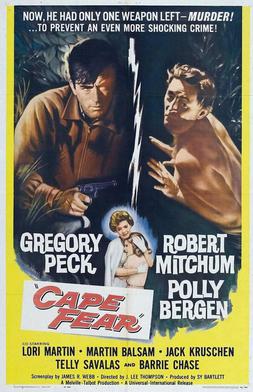A Classic Cinematic Chiller
 - Sam Bowden (Gregory Peck) is a stand-up citizen with a wife, daughter, lucrative career as a lawyer, nice home, and high standing in the community. No different than helping an elderly woman cross the street was Sam's incarcerating testimony against a man guilty of assaulting a woman; little did Sam know that the man, a criminal nutjob named Max Cady (Robert Mitchum), would come after his family when released from prison.
- Sam Bowden (Gregory Peck) is a stand-up citizen with a wife, daughter, lucrative career as a lawyer, nice home, and high standing in the community. No different than helping an elderly woman cross the street was Sam's incarcerating testimony against a man guilty of assaulting a woman; little did Sam know that the man, a criminal nutjob named Max Cady (Robert Mitchum), would come after his family when released from prison.What is scarier than being relentlessly stalked and threatened by a murderous madman? The 1962 classic Cape Fear preys on this relatable fear and encapsulates the chilling Hollywood thriller better than most.
One of the best film composers of all-time (and Hitchcock film scoring veteran), Bernard Hermann, composes a haunting piece of music that embodies the fear and desperation of Sam Bowden's nightmare. With dark melodies, harsh tones, and a particularly spastic horn section, Hermann's score is a constant reminder for the audience that death is dangerously lurking inside every shadow. Cape Fear begins with the highly recognizable and stirring musical number that immediately scares its audience to death - it will not be the last time.
A well-learned student of Hitchcock, director J. Lee Thompson forms Cape Fear into a gripping thriller with suspense galore waiting around every corner. Thompson also tosses in one great shot into the film after another, whether it is through the creation of high suspense through an ambiguous serious of on-screen images, his use of hiding faces in thick shadow or the way the camera follows a character as they take flight. Thompson's stylish and emotional fingerprints are an essential component to this great film but he was also fortunate to have such a brilliant cast to act out this chilling story of good vs. evil.
Hollywood legend Robert Mitchum might only get second billing when the credits roll but make no mistake: he is the entire frightening show. When people refer to Max Cady as "an animal" throughout the film, it is not just an example of nasty name-calling. Mitchum is quite literally a vicious monster: he prowls, slithers, and altogether acts and thinks in an inhuman way. The only difference between Cady and a wild animal is that a wild animal does not have the capacity for problem-solving intelligence. While unstable, Cady is in fact smart and actually plans out his evil actions, making him all the more dangerous. But Mitchum is not just scary in the things his character does, he is also scary in the way he talks and holds himself upright. Needless to say, Mitchum gives an incredible performance - the audience completely forgets about all the times they have rooted for and felt safe around Mitchum's tough guy anti-hero protagonists in the past because he is such a terrifying force in Cape Fear.
Mitchum's powerful showing is the film's focal point; however, fellow Hollywood legend Gregory Peck also gives a strong leading performance in Cape Fear (while also fullfilling his duties as one of the film's co-producers off-screen). On paper, the Sam Bowden role is pretty tame and colorless; however, thanks to Peck's strong screen presence, Bowden becomes a memorable character even next to the unforgettable Max Cady character through a steadfast subtlety. Despite a roaring Robert Mitchum co-star stealing every scene, Peck effortlessly rallies the audience to his character's cause with a career highlight of his own.
While the two leads dominate the screen, Cape Fear is also full of great supporting performances. Polly Bergen cannot help but be beautiful in the film but she also gives a rather intense performance as Sam's wife Peggy, Martin Balsam does well in his helpless Police Chief role, and a pre-lollipop sucking Telly Savalas gives a good performance as Private Eye Charles Sievers. However, Lori Martin does not consistently offer up the best of performances in her role as Sam's daughter Nancy. In many instances throughout the film, the physical aspects of Lori's acting fail to put a cap on some of the more suspenseful scenes. However, she is not completely unwatchable - or even bad - throughout the film, often convincing as a terrified child and hardly taking anything away from the overall quality that Cape Fear has to offer.
Accompanied by many high-quality elements, Robert Mitchum's brilliant yet cruel acting and J. Lee Thompson's right on the money direction especially makes Cape Fear an incredibly thrilling film. Its just-as-popular 1990s remake does not begin to do it justice but few films in general can touch the stylish but uneasy and down-right frightening feeling of 1962's Cape Fear.
CBC Rating: 10/10
